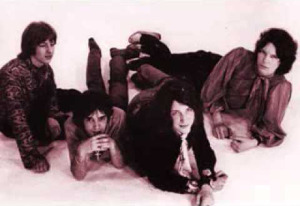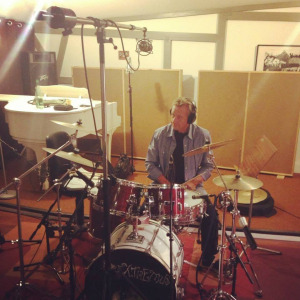You could be forgiven for not immediately knowing who Mabel Greer’s Toyshop are. That name has not exactly been pervasive in the music press. However, hardcore fans of the legendary progressive rock ensemble Yes will recognize MGT (whom we will sometimes also refer to as just “Mabel,” as fans are starting to do) as the place Yes came from, a long, long time ago. Yes indeed, way back in 1966, founding members Robert Hagger and Clive Bayley, together with original Yes-men Peter Banks and Chris Squire, were starting to make music as MGT, something pop oriented and even a little folksy. Then, that Jon Anderson fellow had to come along and start having long, late night talks with Chris Squire, and everything got messed up. Depending on how you look at it, of course. MGT did not continue as an active entity, although material had been written and performed at the time. So, it’s more than a little unexpected that, 45 years later, they have a new album called NEW WAY OF LIFE due out, featuring Hagger and Bayley, along with Yes alumnae Tony Kaye and Billy Sherwood, and bassist Hugo Barre as the main newbie. The album succeeds in not only being eminently listenable, but in setting itself far apart from Yes-pectations (a word that might as well be officially used to describe the always-changing state of Yes fanship through the years and the rotating lineups). Such tunes as “Get Yourself Together,” “Images of You and Me,” “Singing To Your Heart” and the melodic title track are muscular, well-conceived tracks that feature pleasant harmonies, energetic playing and a joyful spirit that is almost celebratory in nature. After all this time, the band probably knew that full surrender was the best way to go with a project that has taken so long to be realized. One thing that is a bit surprising with regard to Yes is that two songs on the first Yes album, “Beyond and Before” and “Sweetness” have been totally redone here. We’ll let the band explain how that came about in the following interview, conducted via email.
Whatever preconceived notions that listeners bring to this project, it’s fair to say that if you set those aside and just listen, you’ll hear some classic old-school British rock that is influenced by its prog roots to an extent, but also straightforward in its desire to showcase the melodies and tight musicianship of this new-old ensemble, with nothing pretentious or self-indulgent to mar the result. There are a couple of instrumentals, and a few tunes that probably won’t set the world on fire, but this is just pleasant, well-crafted rock with hints of nostalgia that should make most listeners smile. Mabel Greer’s Toyshop clearly had a barrel of fun with this album, and it’s an easy bet that they will keep it going. They are doing exactly what they want to do, and the intimidating musical legacy that they’ve come from, while echoed here and there, does not straightjacket this new record in any way. It’s an admirable feat they’ve accomplished, one that is a bit unprecedented in the annals of progressive music. There were many questions worth asking the band, but the following interview tells a great deal about their unusual journey to this point:

THE MULE: Although it’s not unprecedented for a group that was better known as the earliest incarnation of a more prominent group to “reunite” and release new music, it’s also not common. How did this project ultimately come about?
ROBERT HAGGER: Ironically, I think it may have been the death of Peter Banks that was a catalyst. On March 15, 2013, I was on a flight from Dubai to Johannesburg and read in a newspaper that “Peter Banks, former lead guitarist with Yes and Mabel Greer’s Toyshop, died on March 7 from heart failure at the age of 65.” THE (London) TIMES dedicated three-quarters of a page to the story. Mabel Greer’s Toyshop was mentioned in the article, although inaccurately reporting that, “the band was formed by Banks and Chris Squire.” In reality, Clive and I asked Chris to join following my audition with the band, the Syn. Chris then invited Peter and Jon Anderson to join us. Peter made a huge contribution to what we were doing at the time. I started swapping emails with Clive and we agreed to meet up in July in France at the Le Petit Maison in Nice, a restaurant opposite the opera house. It’s a surreal experience to meet someone again after 45 years! We had a lot to talk about and during the meal he blurts it out, “we should reform Mabel Greer’s Toyshop.” We all fall about laughing, but it hits a nerve, and we agreed to book some studio time in August.
CLIVE BAYLEY: Mabel was always “unfinished business” for both of us; we thought the music deserved to be carried through to a larger audience.

THE MULE: Most hardcore Yes fans will likely know of you guys, but perhaps not the prog audience at large. What would you say distinguishes the current musical style you’re creating from the ‘60s incarnation of the band?
CLIVE: Back in the ‘60’s our style was likened to a crossover of Pink Floyd and the Byrds; strong melody lines and good harmonies, albeit a little more classic rock oriented (as was carried over to the Yes incarnation). If anything, the Mabel melody lines are perhaps even stronger and heavier now and include 45 years of influences from far and wide.
THE MULE: It was a bit of a surprise to hear the tracks “Beyond and Before” and “Sweetness” redone on this record, as those tracks were on the first Yes album and heavily featured Jon Anderson. What made you decide to record those songs, and are you concerned at all that your take on them will suffer by comparison to Anderson’s distinctive style?
ROBERT: “Beyond and Before” was always the Mabel opening piece at gigs, even before Jon Anderson joined us. The song, written by Clive and Chris Squire, is part of our history, we couldn’t possibly leave it out.
CLIVE: Jon is a great singer, and we all enjoy the Yes version… but, we wanted to do the melody lines more like the original Mabel version. Regarding “Sweetness,” which I co-wrote with Jon and Chris… again, Jon’s version is great, but my voice is an octave lower and a different style. The interesting thing about the Mabel version of “Sweetness” is the lead guitar running through the song in counterpoint which twists it into another style, I think.

THE MULE: Talk about your compositional process a little: How did tracks such as “Get Yourself Together” and “Images of You and Me” originate and develop into the arrangements we hear? Then elsewhere, you have tracks that are mostly instrumental such as “King and Country” and “Oceans”… how are aesthetic decisions like that made? Does everyone have to agree on the elements of a song, or do a couple of you get to pretty much determine the direction of a tune?
CLIVE: I think songwriting and arranging really is my thing. So in a lot of the arrangements I was trying to create a fuller, more interesting sound than we had achieved on the older material. The new songs just kind of fell into place. On “New Way of Life,” Billy altered the bass line from what we had originally and this seemed to change the style of the song quite a bit. He just did it, we all liked it, so we kept it. Billy’s style worked well as he intuitively caught where the European part of the band were coming from… great job from both him and Tony Kaye.
ROBERT: “Get Yourself Together” and “Images” were, again, written back in 1967. When we went back in the studio to record them we did it from memory, which was an interesting experience in itself. It’s important to note that the only rehearsal we had was to play the numbers through once or twice and then lay down the tracks. There are advantages and disadvantages in doing it this way. We sacrificed some quality to retain the vibe and energy.

THE MULE: “Oceans” makes it pretty clear that you guys are comfortable with long instrumental passages and “painterly” style soundscapes. Might you consider doing an all-instrumental recording someday?
CLIVE: The music piece determines if vocals are required… alternatively, if a strong melody line is created then the backing can be hard rock or delicate, it just kind of evolves. Yes, I would like to do an instrumental with strings and a choir sort of thing, but I suspect a melody line will creep in somewhere as a vocal. I do like Rock Opera, music telling a story. I wrote an album called KING AND COUNTRY, (which has) not yet been released, that does this. Strangely, it was based on TESTAMENT OF YOUTH, which is now about to be released as a major movie. I would like to re-record this album or update it at some point in time.
THE MULE: Clive and Robert, what was it like revisiting something you did so long ago? Were you at all concerned about being in the shadow of Yes as you embarked on this project?
CLIVE: I don’t want to emulate Yes, they are a wonderful band and they are Yes. However, you can detect where some of the Yes sound came from, and with a little imagination, you have a different take on where it could have gone if we had remained involved. I don’t rate myself as a great guitarist like Steve Howe or Peter Banks… but, I think I can write and arrange some nice sounds, and want to share that.
ROBERT: When Clive and I formed Mabel back in 1966, we knew we had something special. Even at the age of 16, Clive was writing stuff like “Beyond and Before” and “Jeanetta,” still one of my all-time favourites and also included on the new album. There is no question of being in the shadow of another band, we are just making our offering and if a few people enjoy it, then we will be happy.

THE MULE: Tony Kaye and Billy Sherwood are in the unique position of having played with later versions of Yes; in fact, Tony played in early AND later incarnations. Would love it if you guys could share your insights into what it was like during your particular eras with Yes, and how those experiences influenced you for this new MGT project. Do you still have contact with Chris Squire, any of you? Has he heard the new work?
BILLY SHERWOOD: I was lucky enough to tour with the 90125 (Yes) lineup in 1995, for their TALK record, after that, the band reverted back to the classic lineup as it’s known, with Howe and Wakeman. I was called in to produce/mix for that lineup during the KEYS TO ASCENSION sessions. After that phase, they broke up and it was at that point that Squire and myself began writing and sending tracks around to Anderson, who got involved in this new writing wave… which became the OPEN YOUR EYES record. This is when I joined as a full member, touring that record and the following record THE LADDER. This would be the third Yes lineup I had the pleasure to play with. I left the band in 2000 to go back into the studio production world, making many records, some of which included various Yes members… (THE PROG COLLECTIVE 1 and 2, the Fusion Syndicate, William Shatner‘s PONDER THE MYSTERY among other records). As a result of my ongoing relationship with Yes, I was asked to come in and mix their most recent studio record, HEAVEN AND EARTH, as well as their live DVD from Bristol called LIKE IT IS. I am currently just starting to mix another Live Yes DVD from Mesa, Arizona… Regarding Mabel Greer’s Toyshop, it was a part of Yes history in that the early seeds of Yes were housed within that band in many ways. When I was asked to come on board to make their new record, it was an honor. As a Yes fan, knowing the backstory of where it all began, I felt it was something special to be involved with such history by pushing it forward into the future. I really enjoyed playing on the record and producing/mixing, it was a labour of love indeed!
(Tony Kaye was also part of the Mabel Greer’s Toyshop/Yes transition in June to August 1968 in London, and was of course the keyboard player on the versions of “Beyond and Before” and “Sweetness’ that featured on the first Yes album. Tony was very pleased to be involved in the revival album with Clive and Bob, and enjoyed playing the old material again. He has also been working with Billy Sherwood on their joint-project and new album with the band Circa… Tony was not available for this interview).
THE MULE: You are billed as an “English psychedelic rock band” on your web site. What does the term “psychedelic” mean to you. Has audience perception of that word changed since the ‘60s?
ROBERT: We used the term “psychedelic” with the meaning “mind-revealing” in that the music was designed to change the state of the listener’s mind by sound effects and reverberation. As an example, just listen to some of the intros and specifically to the track “Oceans” on the new album.
CLIVE: Yes, audience perception of “psychedelic” has changed. We were dressed differently then, and when we started out it was the pre-Flower Power era. The ‘60s were a great time of peaceful protest and desire to change the establishment, too. Bob Dylan, Jimi Hendrix, we were all breaking new ground. I think we tend to use the term “psychedelic” loosely… it could encompass a protest movement, new way of life, breakout… But, using the word “psychedelic” also brings back images of that era where all these things were going on.
THE MULE: Talking about this area a little more, progressive rock sort of had its heyday in the ‘70s with groups like Yes, Genesis, King Crimson and Pink Floyd. Then it fell out of favor for many years, partially due to punk and new wave, but a new crop of bands like Porcupine Tree, Spock’s Beard and many more proved that prog rock still had a massive audience in the ‘90s and beyond. What do you guys see as the importance and appeal of prog rock? Do you see yourselves fitting into that realm, even though some of the tracks on your new record are essentially straightforward pop songs?
CLIVE: I think we are flexible enough to try different styles. The title track, dare I say, is more country and western than prog rock. A bit like the last Muse album where they introduced some R&B tunes, that shocked a few people. We like to experiment a lot, which again, is that psychedelic label, but it doesn’t ALL have to sound like Flower Power… if that makes sense?

THE MULE: Does it affect groups like you that made your first mark in a very different musical era, that the technology and distribution systems have changed so much? Do you think music has been devalued by mp3s and the like, or is it just the inevitable change that musicians have to adapt to? How do you personally see the music business these days?
CLIVE: Well, Bob and I are getting back in so we are seeing the music business in a new light after a long gap. It clearly has changed. I think we all have to constantly adapt quickly as the world is speeding up now and more and more will change. Go with the flow but keep your integrity and create what you believe in.
ROBERT: In the old days, musicians could not rely on record sales to make a living, they had to go out and play in front of an audience. Funny that today is the same…
THE MULE: For those who don’t know, what is the origin of the band’s name? Was there ever any thought about going out under a different name when you got together again?
ROBERT: Back in the ‘60s, interesting, way-out names were the way to go: Big Brother and the Holding Company, Jefferson Airplane, Crazy World of Arthur Brown, et cetera. So we became Mabel Greer’s Toyshop. This whole project was about reviving the vibes that we had going in the beginning, so it would have been counter-productive to rename the band, although it seems that everybody now refers to it as just plain “Mabel… ”
THE MULE: What are your biggest hopes as you launch into this new phase of the band’s career? Will you be touring a lot? Will you be doing other early Yes songs besides the ones on the record? And do you think there will be more albums down the road?
CLIVE: No, I don’t think we will do any Yes songs. We will do some showcase gigs and see what happens. I am definitely arranging the next album soon; we already have a lot of new songs for it. And I want to do that Rock Opera thing or themed album. We are happy to do a new album every year if the audience likes it. Constantly trying to create exciting music, whatever shape it takes. Let’s see where this “NEW WAY OF LIFE” takes Mabel after March 9…
NEW WAY OF LIFE will be released as a digital download and CD on March 9, 2015 by RSK Entertainment. For more information, visit the band’s website at mabelgreerstoyshop.com.


